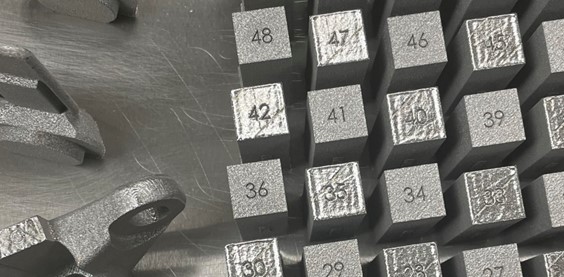Senvol recently demonstrated a machine learning approach to material allowables development that was shown to be more flexible, cost-effective, and time-effective than the conventional approach.
By Senvol, USA

The work was done as part of a US Government contract W911NF-20-9-0009 to apply machine learning software Senvol ML to enable rapid development of material property allowables for additive manufacturing (AM).
Partners on the program included EWI and Pilgrim Consulting. Battelle and Lockheed Martin Fellow, Hector Sandoval, also served as technical advisors on the program. The contract was administered by the National Center for Manufacturing Sciences (NCMS) through the AMMP Other Transaction Agreement (OTA) program.
As part of the program, Senvol demonstrated a new approach to material allowables development that leverages machine learning, an approach that is extremely flexible and able to handle any change to the AM process, making it ideal for sustainment in the long term. The program focused on demonstrating the approach using a 17-4 PH stainless steel material processed via a powder bed fusion AM machine.
Leveraging machine learning
“Material allowables development is a very expensive and time-consuming endeavor,” said Annie Wang, President at Senvol. “Senvol’s program was very successful in demonstrating a new approach to additive manufacturing (AM) allowables development that leverages machine learning.”
AM is starting to enable lightweight and rapidly produced designs that are revolutionary to various defense and commercial capabilities and applications. These benefits cannot yet be fully realized due to the time and high cost of allowables development.
The high cost stems largely from the fact that material allowable development requires an enormous amount of empirical data to be generated, at a fixed processing point, meaning that all of the empirical data must typically be regenerated from scratch every time there is a major change in the process. This results in an AM process that is not only costly and time-consuming to implement the first time, but also in the long-run when there are inevitably changes to the AM process.
Hector Sandoval, who reviewed the AMMP program technical approach and test results, adds, “It was exciting to support the AMMP program by reviewing the technical approach, test results, and final presentation. It was great to get a first-hand look at the potential of leveraging a machine learning-based approach to help establish material allowables.”
Qualifying AM processes
Senvol ML software supports the qualification of AM processes and was used in the program to develop statistically substantiated material properties analogous to material allowables. Furthermore, it did so while simultaneously optimizing data generation requirements. Important to note is that the software is flexible and can be applied to any AM process, any AM machine, and any AM material. Also of note is that this project did not develop true allowables. Due to budget and programmatic constraints, the project team had to make several simplifying decisions.
Senvol President Zach Simkin comments, “The use of machine learning for AM process and material development is very mature. This has been adopted by industry and is the low-hanging fruit. The use of machine learning specifically for material allowables development, however, is still a work in progress. I’m pleased that we have now made two successful demonstrations of the machine learning approach to allowables – once in this program using a metal alloy and comparing to MMPDS, and once in a prior program funded by America Makes that used a polymer material and compared to CMH-17 – but more research is needed. The upside is tremendous, and we look forward to continuing to partner with the Government and industry to advance work in this area.”
Dr. William E. Frazier, retired Chief Scientist for Air Vehicle Engineer at NAVAIR / The Navy Senior Scientist for Material Engineering, and currently President of Pilgrim Consulting LLC, adds, “Senvol’s machine learning-enabled approach directly addresses a major industry challenge: the rapid and cost-effective development of additive manufacturing material property allowables…In my opinion, the further development of this technology will have a positive impact on the cost, schedule, and performance of both defense and commercial platforms.”

